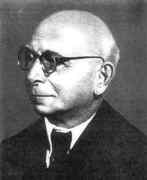Person: Bernstein (2), Sergei

Sergei Bernstein was a Ukranian mathematician who made important contributions to partial differential equations, differential geometry, probability theory and approximation theory.
Mathematical Profile (Excerpt):
- After one year studying mathematics at the Sorbonne, Bernstein decided that he would rather become an engineer and entered the École d'Electrotechnique Supérieure.
- Bernstein returned to Paris and submitted his doctoral dissertation Sur la nature analytique des solutions des équations aux dérivées partielles du second ordre Ⓣ(On the analytical solutions of partial differential equations of second order) to the Sorbonne in the spring of 1904.
- Bernstein received his doctorate from the Sorbonne in 1904 and left Paris to attend the International Congress of Mathematicians in Heidelberg later that year.
- The Congress lasted 8 August to 13 August 1904 but Bernstein remained at Heidelberg until the spring of 1905 when he went to St Petersburg.
- Despite this excellent work, and the fact that he had already received his doctorate, when Bernstein returned to Russia in 1905 he had to start his doctoral programme again since Russia did not recognise foreign qualifications for university posts.
- In 1906 he passed his Master's examination at St Petersburg but only with difficulty since Aleksandr Nikolayevich Korkin, who examined him on differential equations, expected him to use classical methods of solution (some sources say that Bernstein only passed the examination at the second attempt).
- Dmitrii Matveevich Sintsov and Antoni-Bonifatsi Pavlovich Psheborski examined his thesis and from that time Bernstein was able to lecture at Kharkov University as a dozent.
- However, life was not what Bernstein hoped for, and he wrote to Hilbert saying that his situation was "hopeless".
- In the spring of 1910 Bernstein went to Göttingen to talk to Dunham Jackson who was visiting Göttingen from Harvard.
- The thesis had been completed a year earlier and the results of the thesis had earned Bernstein a prize from the Belgium Academy of Science in 1911.
- Both de La Vallée Poussin and Bernstein made some progress in the following years and then the Belgium Academy of Science offered a prize for a solution.
- Bernstein gave a complete solution in 1911, introducing what are now called the Bernstein polynomials and giving a constructive proof of Weierstrass's theorem (1885) that a continuous function on a finite subinterval of the real line can be uniformly approximated as closely as we wish by a polynomial.
- In 1927 Gösta Mittag-Leffler died and Bernstein was elected as a corresponding member of the Académie des Sciences in Paris to replace him.
- The Russian Academy of Sciences had been renamed the USSR Academy of Sciences in 1925 and, in 1929, Bernstein - already a corresponding member since 1924 - was elected a full member.
- Beginning in 1933 many lecturers and students at Kharkov were arrested and some were shot but, fortunately for Bernstein, he had left just prior to these events.
- In 1932 Bernstein left Kharkov to become head of the Department of Probability Theory and Mathematical Statistics of the Mathematical Institute of the USSR Academy of Sciences in Leningrad.
- Bernstein left Leningrad and went to the town of Borovoe between Astana and Kokshetau in the north of Kazakhstan.
- Bernstein began teaching at the University of Moscow and over the next seven years he worked on editing Pafnuty Chebyshev's complete works.
- At the International Congress of Mathematicians at Cambridge in 1912, Bernstein talked about his work on constructive function theory, which today is called approximation theory.
- Bernstein continued to develop these ideas, solving problems in interpolation theory, giving methods of mechanical integration and, in 1914, introduced a new class of quasi-analytic functions.
- Some of Bernstein's most important work was in the theory of probability and he wrote an important text Probability theory (1911) (4th edition 1946) even before the award of his Russian doctorate.
- For this brilliant book, Bernstein was awarded a prize by the Académie des Sciences in Paris.
- Bernstein also studied applications of probability, in particular to genetics.
- An important paper he wrote on this topic is Mathematical problems in modern biology (1922) which contains what became known as the Bernstein problem.
- Bernstein's Collected Works appeared as a four-volume work between 1952 and 1964.
Born 5 March 1880, Odessa, Ukraine. Died 26 October 1968, Moscow, USSR.
View full biography at MacTutor
Tags relevant for this person:
Origin Ukraine
Thank you to the contributors under CC BY-SA 4.0! 

- Github:
-

- non-Github:
- @J-J-O'Connor
- @E-F-Robertson
References
Adapted from other CC BY-SA 4.0 Sources:
- O’Connor, John J; Robertson, Edmund F: MacTutor History of Mathematics Archive
